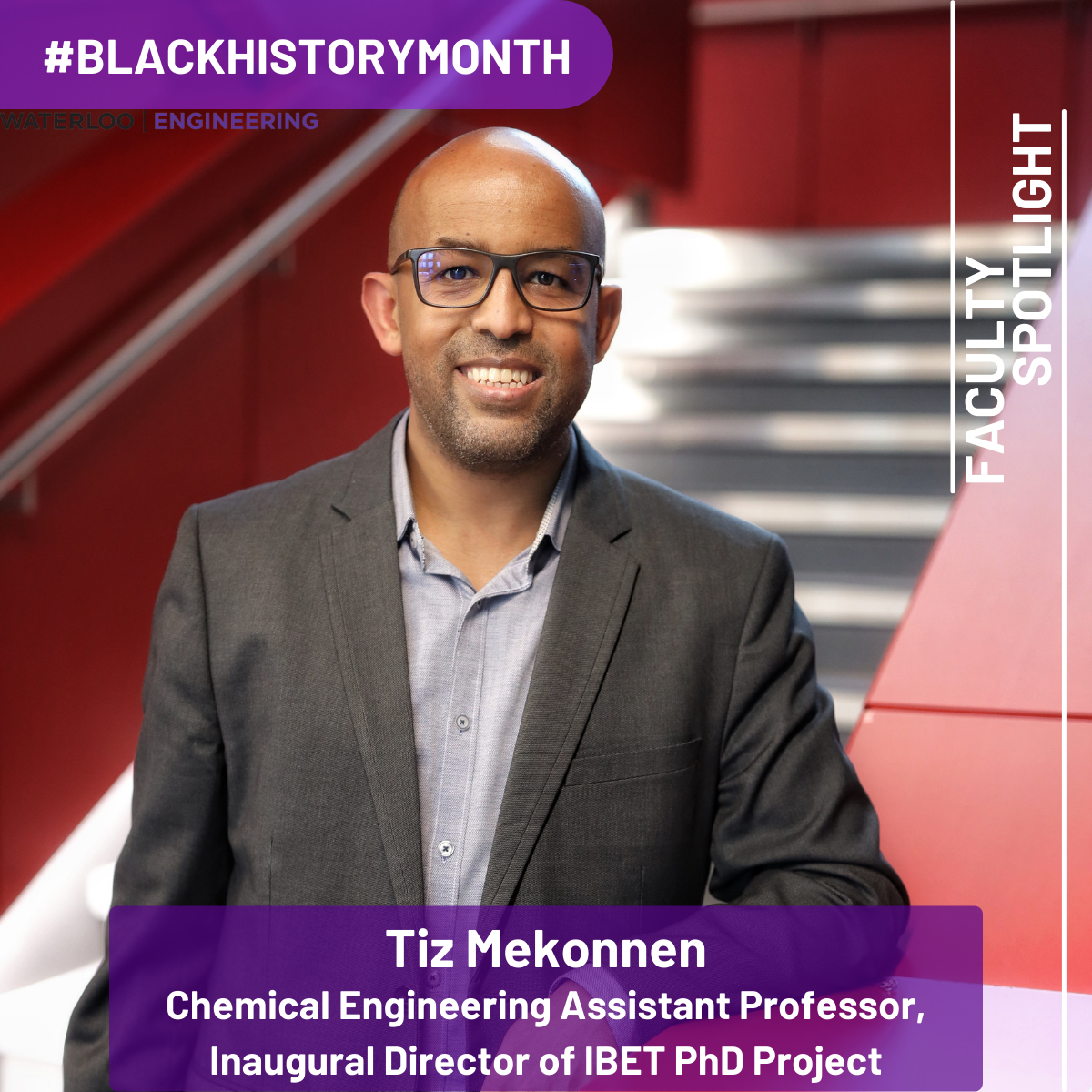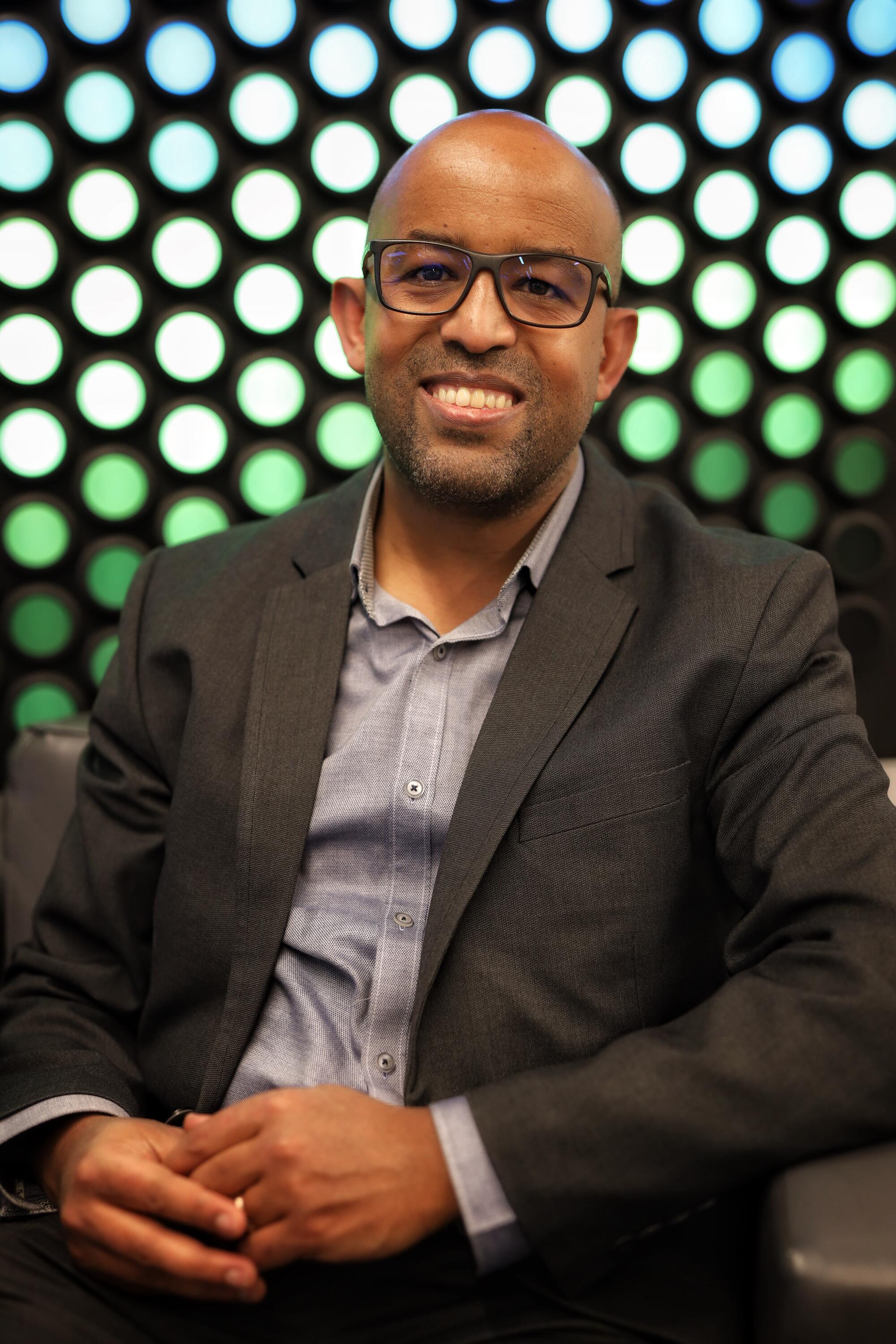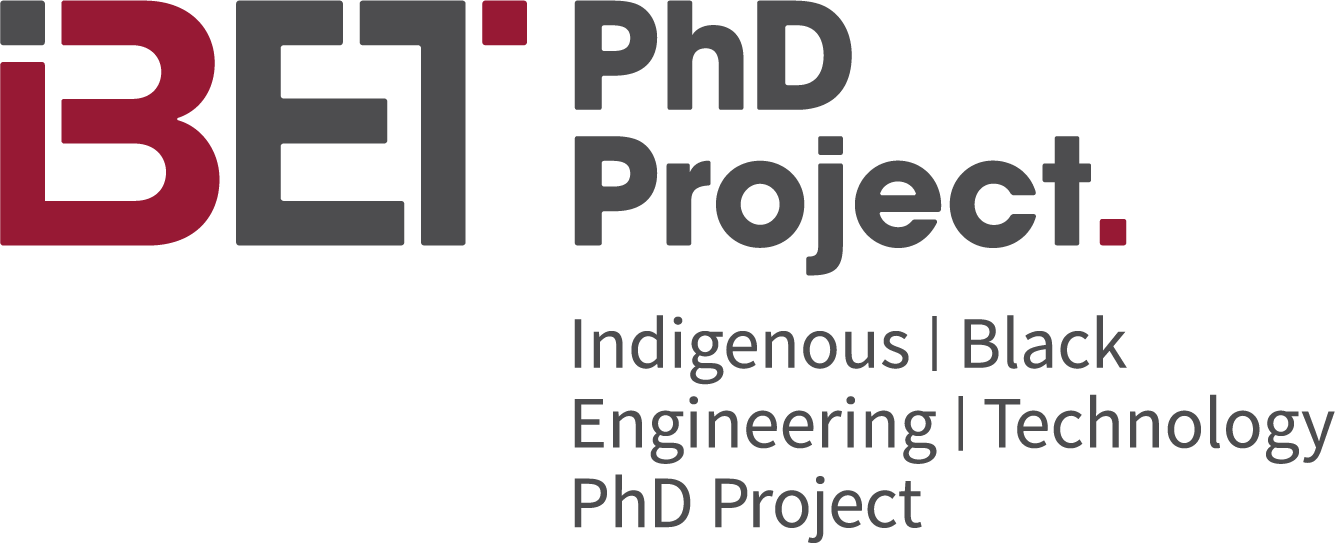
Introduction
My name is Tiz Mekonnen and I am an assistant professor in the department of Chemical Engineering at the University of Waterloo. I also serve as the inaugural Director of the Indigenous and Black Engineering and Technology (IBET) PhD Project - a Canada-wide initiative.
My research focuses on the design and development of sustainable polymers. We combine chemical synthesis, polymer processing, material properties, and characterization to advance the functionality and sustainability of polymers and polymer nanocomposites. I also teach undergraduate and graduate students. As the director of the IBET PhD Project, I coordinate and lead IBET’s activities, as well as work with other institutions across the country to expand the consortium. In my spare time, I enjoy playing soccer with my young children.
What does it mean to you to be a Black engineering professor?
I am proud to be a professor at Waterloo Engineering. I belong to a supportive department and faculty, where I am fortunate to work with highly accomplished colleagues and bright students. While the engineering professoriate in Canada is relatively diverse overall, the numbers paint a bleak picture when it comes to Black and Indigenous people. At the companies I have worked at and at the many conferences I have attended, it is common to find that I am one of few, if not the sole, Black person. When I speak to students, it is common to hear that they have never been taught by a Black teacher or professor throughout the entirety of their academic career. We need more Black professors at the highest level to serve as models for the younger generations.
What is your favourite UWaterloo Engineering memory?
My favourite memory is participating in the Faculty of Engineering’s graduation ceremony in 2018, where I was afforded the chance to hand out diplomas to hundreds of new graduates for the first time as a faculty member. Additionally, in my research lab, the graduation of my first master’s student was a special moment.
What changes would you like to see within engineering (either in school or professional spaces) in the next 5-10 years?
What drew me to Waterloo Engineering was its reputation for excellence in engineering education and research. As such, I would like to see Waterloo Engineering continue to excel in research, innovation, and impact.
Through my involvement in the IBET PhD Project, I have been able to closely evaluate the substantial gap in the academic landscape of Black and Indigenous professors in engineering faculties. As it stands right now, this landscape is not reflective of Canadian society. How can we ask our prospective Black and Indigenous high school students to consider pursuing an education in engineering if they do not see professors who look like them? I look forward to the continued support and commitment from university leaders to increase the representation of Black and Indigenous professors in front of the classroom.
Insight into The Indigenous and Black Engineering and Technology (IBET) PhD Project
 An
Overview
of
the
IBET
PhD
project
An
Overview
of
the
IBET
PhD
project

The IBET PhD Project was initiated by the University of Waterloo with the aim to diversify the academic landscape of engineering and technology across Canada. It was launched in January 2021 by the inaugural partners: McMaster University, Queen's University, University of Ottawa, University of Toronto, University of Waterloo, and Western University. Since then, the consortium has expanded to include McGill University, Ontario Tech University, Ryerson University, University of Alberta, University of Calgary (Schulich School of Engineering), University of Windsor, and York University (Lassonde School of Engineering). To date, there are seventeen recipients of the prestigious IBET Momentum Fellowship, with numbers expected to reach around one hundred Fellows at the peak of the Project’s current five-year commitment.
IBET was modelled after the highly successful American initiative, the PhD Project, which provides funding and mentorship for Black, Hispanic, and Native American students looking to pursue advanced degrees in business. IBET is committed to providing a similar level of support to engineering students within a Canadian context.
The IBET PhD Project consists of three key components – a flagship Momentum Fellowship, a networking platform, and access to a mentorship program. IBET aims to produce highly qualified Indigenous and Black PhD graduates that will be available to contribute to Canadian academics, industry, and government sectors.

Why was this an important initiative for Waterloo Engineering?
Waterloo Engineering is among the top 50 faculties of engineering in the world. As a leader of engineering and technology, Waterloo Engineering recognized the value of diversity in academia and initiated the IBET PhD Project through a collaborative effort with other powerhouse engineering faculties across Ontario. Since the launch of the project in January 2021, other engineering faculties have joined the consortium, making the initiative truly pan-Canadian.
Why is the IBET Project focused on PhD studies rather than Bachelor's or Master's programs?
Our choice to focus solely on PhD studies was a practical one; as we are looking to increase diversity across academic institutions via doctoral studies as soon as possible, it was important to the IBET consortium to target students who were already in the later stages of their academic careers. While the IBET PhD Project is a crucial initiative in terms of making PhD studies in engineering accessible to Black and Indigenous students, it fixes only one section of a larger educational pipeline that is in desperate need of repair. The lack of diversity in classrooms dissuades young Black and Indigenous students from pursuing advanced education in engineering; thus, by offering the IBET Momentum Fellowship to those considering PhD studies, we can foster support at earlier educational stages by increasing the number of professors working in academia.
How are the mentors currently working with the IBET fellows?
As of now, all 17 of our IBET Momentum Fellows are paired with mentors for the first year of their PhD studies. The mentors and their mentees are expected to meet virtually several times throughout the year, allowing Fellows to network with experts working in both academia and industry whilst ensuring they have support through the rigorous process of obtaining a PhD. IBET Momentum Fellows are given control as to whom they would like to work with, as we are cognizant of the fact that our doctoral candidates vary in terms of their mentorship needs - some fellows look for shared life experiences, whereas others are focused on research compatibility. That being said, we are constantly striving to grow our mentor pool to provide our fellows with as much choice as possible to ensure their needs are met to the best of our abilities.